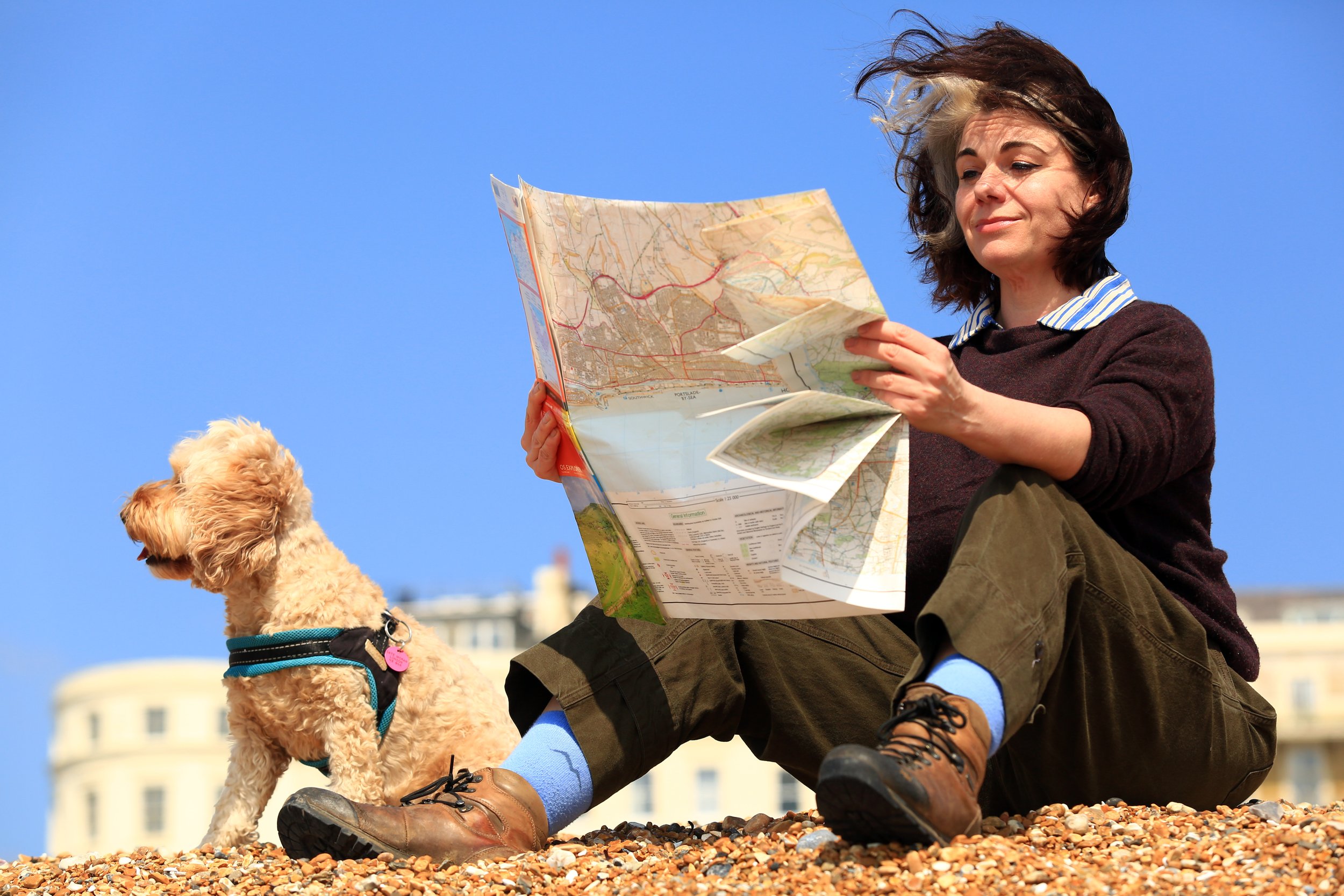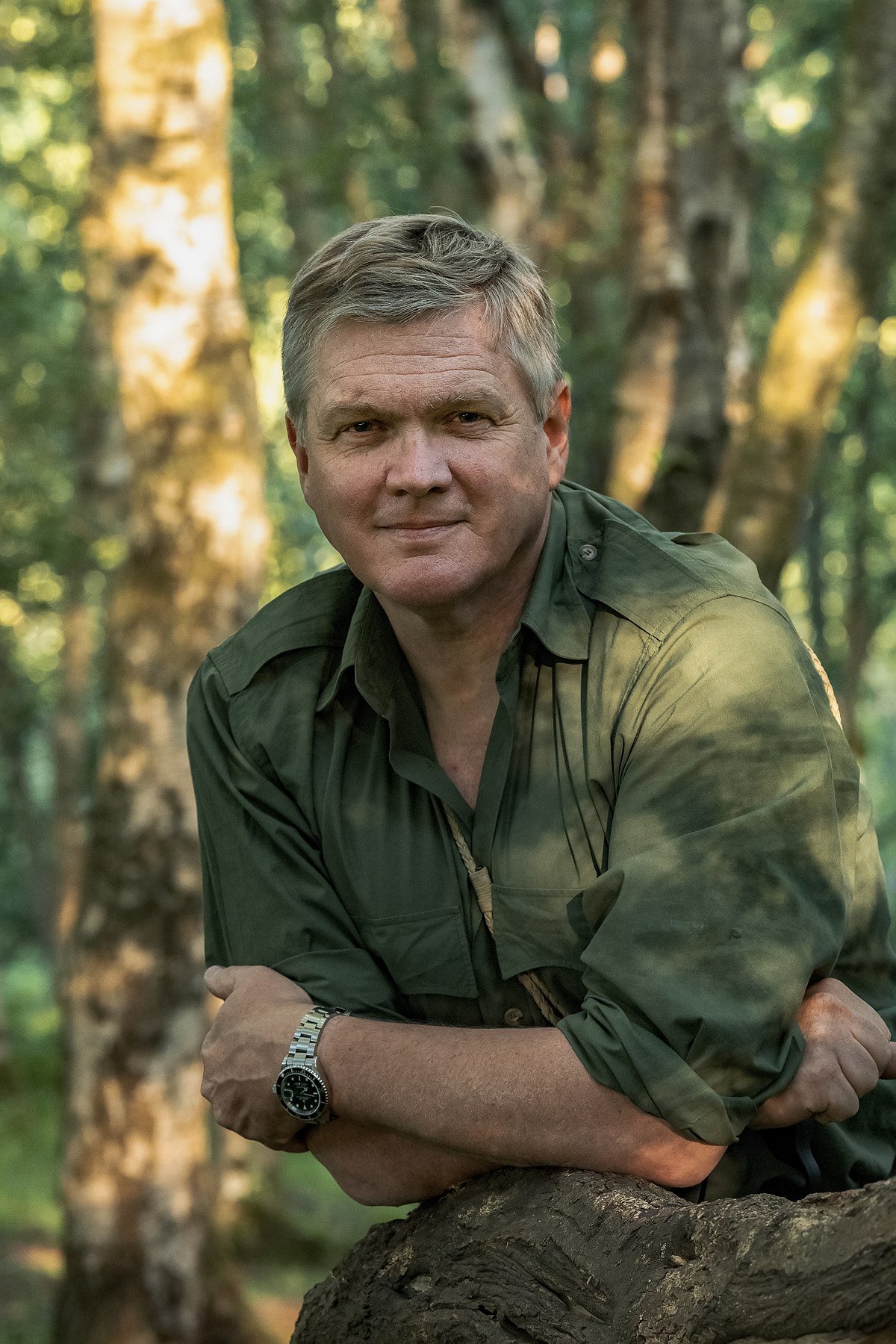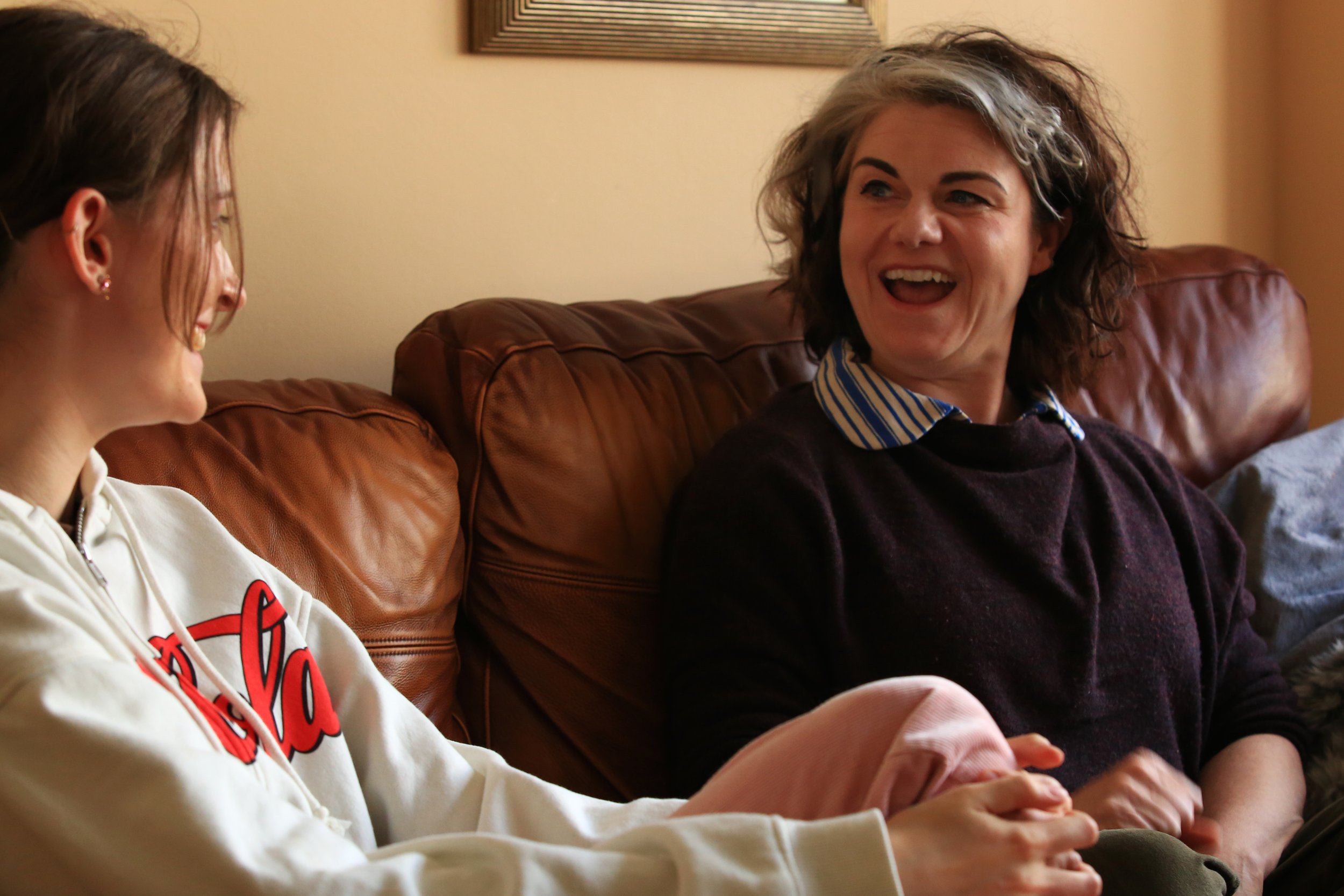Caitlin Moran on Brighton beach with two of her obsessions: an OS map and Luna the dog.
In the latest issue of Country Walking, we take a walk with award-winning writer, feminist and wildlife fan CAITLIN MORAN. But as you might expect from someone with Caitlin’s way with words, she said more than we could possibly fit in the magazine pages. Here, then, are some extra gems we thought you’d enjoy…
On heroes
“I love Ray Mears so much. Me and my sisters all have the hugest crush on him. Apart from my husband, my ideal blokes are Ray Mears and Aslan. Aslan was the sexy pivotal lion in my life.”
On the dawn chorus
“When I was a kid, the dawn chorus was my favourite thing in all the world. It still is – when you can actually hear it. As a kid I knew what every bird was; our garden was just filled with them. I totally took for granted bullfinches and goldfinches and chaffinches, swallows; swifts nesting on the roof. It was only when I moved to London that I was like, ‘Hang on, there’s no dawn chorus, the garden is empty, and the hedgerows are silent’. I’ve become aware of how empty stuff has become just in my lifetime. We used to have hedgehogs going across the lawn, you absolutely accepted frogspawn and toadspawn as part of life. But have my children ever seen a hedgehog in the garden? Nope. When we came out of lockdown and I saw a bullfinch just outside Welwyn Garden City, I cried for 20 minutes.”
On fishing
Paul Whitehouse and Bob Mortimer. Caitlin caught one of them.
“I love the work that people like Paul Whitehouse and Feargal Sharkey have been doing about the massive problem of sewage in our lakes and rivers. And people are really taking notice. With them it comes from a love of fishing, of course, and that’s a lost world to me. Dad tried to teach me fishing but it went horribly wrong and I knew it was not the sport for me. Then about five years ago I went fishing with Paul Whitehouse and Bob Mortimer, and Paul tried to show me how to do fly fishing. It’s like jazz ballet with a bunch of string. I completely f*cked it and Paul was like, ‘yeah, you need to be a bit less jazzhands, Cat’. I ended up unpicking twine from Bob Mortimer’s hair. I caught Bob Mortimer, I did not catch a fish.”
On mental health
“I love a great view because it makes my inner monologue shut up. That said, most of the time I am very happy with my inner monologue. I’ve very carefully trained my brain over the years to be very pleasant to me.
“I talk about this a lot with women: you often don’t realise you’ve got an internal voice. And once you become aware that you do, it’s then, well, how are you talking to yourself? And very often, particularly for young women, they will do it very critically. ‘Your skin’s f*cked. Why’s your hair so sh*t? Why don’t you have the right clothes?’ Your inner monologue is constantly criticising you. And I say, do you talk to your friends like that? Would you ever be as unkind to your friends as you are to yourself?
“We need to be as kind to ourselves as we are to our dogs.”
Photo: Tom Bailey/Country Walking
“For me the big breakthrough was when we got our dog. We’d had her for 24 hours and all I’d done was spend the entire time going ‘You are so beautiful! You are so clever! You did your wee-wee in the right place! You found the right place to sleep! Look at you, using your little paws to walk, that’s so clever!’ She’d done f*ck-all of course; this was not a day of high achievement. But then I compared it to what I’d done in the last 24 hours and what I’d been saying to myself about it all – why did you do this? Why did you say that? Why haven’t you done this? Why don’t you look like this? And I was just like, oh my god, I need to start treating myself like I treat my dog. I need to be saying, ‘you’re a good girl, well done! Why not have a nap now? You deserve it!’
“Just imagine what Lorraine Kelly would be saying to you. Or Oprah Winfrey. She wouldn’t be saying, ‘why are you going out looking like that?’ She’d be like, ‘you go girl – you’ve got this!’ So I’ve trained my brain to be a very pleasant place to be.
“It’s also really common among young people as they’re growing up to imagine what other people are saying about them and how they are judging them. My girls would come home from parties saying, ‘oh god I’m sure everyone was talking about how sh*t I looked or the stuff I was saying’. And I’d have to sit them down and say, ‘right, I’m going to give you a really important piece of information now: no one there gives a sh*t about you – in the nicest possible way. Because everyone else in that room is thinking exactly the same thing about themselves.
Caitlin with Country Walking intern Molly Hallissey.
Photo: Tom Bailey/Country Walking
“Your brain is still growing until you’re 25 and the way it thinks during that time is kind of narcissistic. Some part of it is healthy: you give yourself little warnings or notes that help guide your behaviour. But when it reaches the point where you’re destroying yourself, rather than just giving yourself the odd note here and there, that’s where it becomes really harmful. And the worst part is that you then DO become someone that people might talk about negatively, because all you’re ever saying is ‘oh god don’t look at me, I look awful, I’m an awful person’. And it’s draining for other people to have to keep reassuring you that you’re not.
“The worst and best thing that ever happens to you is when you realise something’s your fault. At first you’re like, ‘oh god it’s my fault, I’ve become a really negative person that drains other people’s energy’. But then you can see the bright side: ‘oh, it’s my fault, that means I’m in charge of it, that means I can change it’. If it’s something someone else is doing to you, that’s harder. But if it’s you destroying yourself you can say, ‘right, well, I can sort this out’. Take ownership of your head and say, ‘I am going to make this an amazing place to be’.
“For years I hated being alone because my thoughts were really bad, but now I love being on my own. I have such great conversations with me, especially on walks.
“It’s about becoming aware of your own consciousness. No other creature really has that. We are hyper-conscious creatures. The human brain is, as far as we know, still the most complex thing in the galaxy. We don’t really understand consciousness and why we know we’re alive. We’re learning to drive this thing without a manual. But if you know that your goal is just to be able to hang out with yourself, and make yourself laugh, then that is brilliant.”
On conversations with yourself
“Have little dreams about what you’re going to do in two years or five years. Where would you really like to go for a walk if you could go anywhere? What would your perfect house look like? What would be your best holiday? What kind of friends would you want? If you could have any kind of wig, what would it be? Try and spend as much times as possible having thoughts that you enjoy. And go with it.”
On her new book, What About Men?
“It looks like someone is just going to have to invent the equivalent of feminism for men.”
Photo: Tom Bailey/Country Walking
“For most of my life I’ve been writing about women. But then people keep saying, ‘yeah Caitlin, but what about men?’ And I’m like, ‘I don’t care – they can sort themselves out. I’m Team Tits.’ I mean, the great irony of feminism would be if women solved all of women’s problems and then sorted men out too. But it was so recurrent, and my daughters told me their peers were saying that it’s harder to be a man now. And at first I was like, absolutely not, I can show you rape and sexual assault figures that will categorically prove it’s not harder to be a man.
“But then you see the rise of people Andrew Tate. Girls are being terrorised by this extreme right-wing misogyny. So then I thought, OK let’s take this seriously; there does seem to be a problem and the only people who are giving men advice are the wrong people. If you’re a teenage girl, you’ve got Beyoncé, you’ve got feminism, you’ve got a million websites waiting to help you with whatever problem you’re facing. You look at teenage boys and there’s nothing, not in terms of progressive, liberal and compassionate voices, anyway.
“The only people who are talking to men about gender issues are people like Andrew Tate and Jordan B Peterson, who are not only massively right-wing but also making massive amounts of money off it. So it looks like someone is going to have to invent the equivalent of feminism for men where we go, right, let’s hear what the problems are, understand them and try to do something about them. The main reason why that hasn’t been there is because from a very young age boys are discouraged from talking about their emotions. ‘Man up.’ ‘Boys don’t cry.’ ‘Grow a pair’. ‘You bender.’
“So if you never encourage a boy to admit to a problem or anxiety or fear, they will never be able to admit, ‘I’ve got a problem’. That’s why we’re in the state we’re in now. So yeah; I am not born with some innate womanly wisdom that means I can solve your daddy issues. But I am very happy to try and see what the problem is.”
Caitlin’s latest book What About Men? is on sale from July 6th, published by Penguin.
Photo: Tom Bailey/Country Walking










